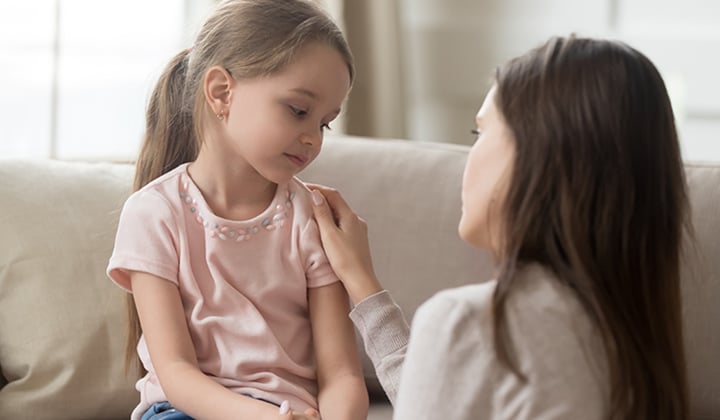
Every year, thousands of children experience the divorce of their parents. In fact, according to the American Psychological Association, between 40 and 50 percent of all marriages end in divorce.
Separation and divorce are emotionally charged events — even for adults — and can be especially traumatic for children. If you are facing such issues, you can help ease the transition for your kids based on how well you work with your former spouse.
The end of a marriage brings a lot of emotions for the adults involved, including anger, grief, sadness and fear. This can make it extremely difficult to put your own feelings aside and remember to put your kids first, but it is imperative to do so. Your marriage may end, but your role as parents has not.
Healthychildren.org recommendations follow.
- Never involve your children in arguments or force them to takes sides. They will always have loyalties to both parents.
- Do not criticize each other in front of your kids or when they might overhear you. Should they hear negative comments you may have made, explain that sometimes people get angry and say hurtful things.
- Discuss your concerns and feelings with your former spouse when your children are not around.
- Always avoid fighting in front of your kids.
Talk to Your Children
Kids need to learn about what’s happening in the family early-on, and, the more you discuss it, the more comfortable they will feel. Children should be able to tell you about their fears and worries about divorce and impending changes. How you respond to their feelings of loss, anxiety and grieving can help them adjust to this major life change successfully. Healthychildren.org offers these guidelines.
- Be open and honest about what is going to happen. Talk about it in simple terms children can understand. For example, “Your dad and I are having some trouble getting along,” or “Your mother and I are thinking that we need to live separately.”
- Reassure your children that the divorce is not their fault. Let them know they are not able to fix the problems. Give your kids permission to continue to love each parent.
- Try not to blame your ex-spouse or show your anger.
- Give your children permission to express feelings of sadness, anger and disappointment.
- Allow time for questions. You don’t have to have all the answers. Sometimes active listening is more helpful than talking. Children may ask why you are getting divorced, if you will get back together, where they will live, if the divorce was their fault, where they will spend holidays, etc.
Let them know their feelings are valid by saying “I know you feel sad now” or “I know you miss mom/dad.” Be a good listener even if what your kids say is difficult to hear. You may notice behavioral changes in your children, which will vary based on their development. Young children may become clingier or have nightmares, whereas older children might have decreased academic performance, moodiness and aggressive behaviors and could begin acting out by experimenting with sex, drugs and alcohol. These behaviors suggest that children are not coping well with the current situation and should prompt you to reach out to your health care provider or a counselor in your area.
Co-Parenting After Divorce
Co-parenting can be extremely difficult, especially if you have a contentious relationship with your former spouse. However, unless you have faced family violence or substance-abuse issues, having both parents involved in the daily lives of your kids is the most advantageous to their adjustment to their new life situation. Making shared decisions, interacting at their extracurricular activities or just speaking to someone you would rather forget about can make co-parenting seem impossible. You need to separate your personal relationship with your former spouse and make this relationship and communication entirely about the wellbeing of your children. You do not have to talk in person — speaking over the phone, texting, or emailing might work best to establish open lines of communication. Kids feel more secure and loved and are emotionally healthier when divorced parents have a cooperative relationship.
Work to keep routines the same in each household.
Having similar rules regarding homework, discipline and bedtime helps kids know what to expect each day regardless of which parent they are staying with at the time. Keep rules consistent. If your children have lost screen-time privileges at your ex-spouse’s house, follow through with that restriction. Also, each parent should have basic necessities such as clothing, personal-hygiene items and toys so children don’t feel like visitors in either home.
Parenting in Step-Families
Approximately one-third of children affected by divorce will eventually become members of a step-family. Relationships in step-families can be complicated. You have the ability to help ease the stress and promote the bonding of this new family. In some cases it can take years to form a bond with a new family member, so don’t pressure your kids to make this relationship work right away. Common stressors in this situation include the formation of a new relationship with a step-parent, having to share parental attention with step-siblings and loyalty conflicts as kids worry that if they become close to the step-parent they are being disloyal to their biological one. Generally, the biological parent should have primary responsibility for control and discipline of the children until the bond with the step-parent has been firmly established. A common mistake is allowing a step-parent to exercise full parental authority in the beginning stages of the relationship.
Take Care of Yourself
The changes that occur with divorce can be overwhelming, and you need to take care of yourself as you cope with them. Utilize your friends and family for support. Formal support groups can be helpful. Stay positive and focus on your new chapter. Take up a new hobby, exercise and eat right. By focusing on your child, you will get through this difficult time with grace.

